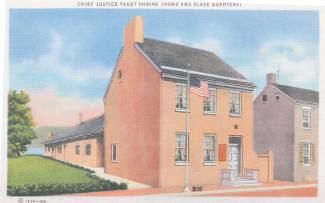Collection Name
About
City to discuss Taney bust
Originally published July 20, 2007
By Justin M. Palk
News-Post Staff
Frederick's aldermen want to discuss what to do about the bust of Roger Brooke Taney in front of City Hall.
Thursday night, Alderwoman Donna Kuzemchak asked city staff to find out what it would take to remove the bust of the controversial 19th-century chief justice of the United States.
"I know this will be a battle," she said. "It does not belong in front of the city center." Taney wrote the Supreme Court's opinion in the 1857 Dred Scott case, declaring that black people, whether free or slave, were a "subordinate and inferior class of beings" who could never become U.S. citizens.
The ruling also struck down the Missouri Compromise, making slavery legal in all federal territories. Frederick's City Hall was formerly the Frederick County courthouse. Alderwoman Marcia Hall said Thursday she has asked the city attorney to review the property's deed to see whether the county included the bust when it sold the property to the city in the 1980s.
If the county still owns the bust, any decision about it would likely involve the Frederick County Commissioners.
Alderman David Koontz said he was sympathetic to the issue, noting that the bust is a historic monument to recognize a locally-born Supreme Court justice. At the very least, though, the city needs to install some sort of marker giving more information about Taney and the Dred Scott case.
While they're looking over that information, people will have to consider their own views about race, Koontz said.
Alderman C. Paul Smith also said he was looking forward to a conversation about the bust.
"Maryland as a state embraced things we reject today," he said. "It is certainly worth talking (about.)"
Earlier this year, Maryland's General Assembly approved a resolution expressing "profound regret" for the state's role in instituting and maintaining slavery. That the aldermen are talking about the Taney bust is a good thing, said Guy Djoken, president of the Frederick County branch of the NAACP.
"I'm very hopeful that at the end of the day ... we are going to come as a community to do the right thing," he said.
This is an issue that is becoming increasingly important for Frederick to address as the city grows and becomes more diverse, said Irene Packer-Halsey, board president of United Latinos of Greater Frederick. "How do we move forward if we don't start with a reflection on the positive and negative aspects of our history?" she said.
Reprinted with permission of the Frederick News-Post and Randall Family, LCC as published on July 20, 2007 at FrederickPost.com
The postcard, from the 1930s, shows the home of Chief Justice Roger Brooke Taney (1777-1864) in Frederick, Maryland. Note the Slave Quarters in the rear. Postcard from the collection of Albert and Angela Feldstein
